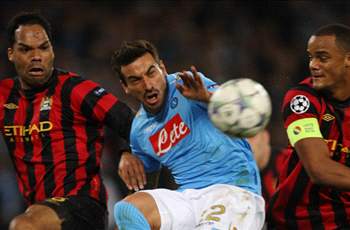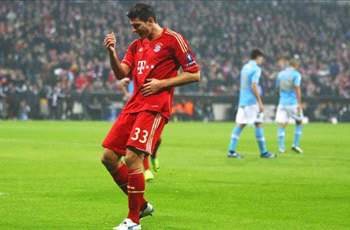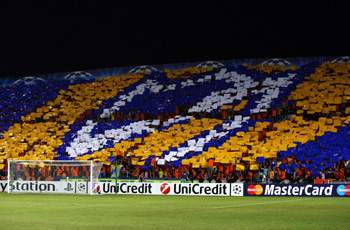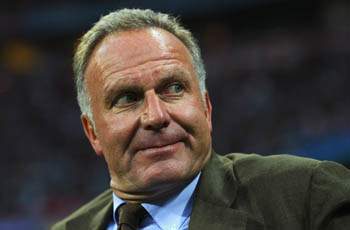The 'league v league' war will recommence, the top scorer award is up for grabs, while the ECA hold the keys to the future of the Champions League.
| THE DEBATE ON 'LEAGUE V LEAGUE' WILL BE REIGNITED |
 When Napoli were paired with Chelsea and AC Milan with Arsenal, a Serie A v English Premier League thread was immediately sewn through the Champions League last 16 seam. The reality is that there is no longer scope for a league versus league debate.
When Napoli were paired with Chelsea and AC Milan with Arsenal, a Serie A v English Premier League thread was immediately sewn through the Champions League last 16 seam. The reality is that there is no longer scope for a league versus league debate. Elite clubs' finances are so far out of sync with the normal operating costs within their own domestic sectors that the debate of which league is stronger can no longer be answered through the Champions League. Ferrari and McLaren, in F1, are not the ultimate indication of how well Italy and England's motor industry is doing, and the standard of the top three or four clubs operating in a domestic league is no longer a useful yardstick to measure depth and quality all the way down the listings.
If Arsenal beat AC Milan it doesn't mean that the English Premier League is stronger than Italy's Serie A. It means that Arsenal are stronger than AC Milan and nothing more. Barcelona and Real Madrid's imperiousness in the Champions League should not mean that la Liga as a whole is regarded as stronger as a result of the Clasico rivals' performance levels.
The definition of a 'good' or 'bad' league is entirely subjective and the true test of a division's strength can best be determined through internal competition - that is the relative strength of the league's participants in relation to one another. But Barcelona, Real Madrid, Bayern Munich, Zenit St Petersburg and the rest of the ultra-rich teams in the Champions League did not choose in which domestic championship they compete.
Clubs in that financial stratosphere operate like city states of old; it is a matter of irrelevance who the neighbours are. Teams at this stage of the competition are not immediately preoccupied with the addition of Uefa co-efficient points; that is an incidental factor which will be countenanced at the end of the season.
But perhaps Uefa should stop cutting club allocation along national lines. Why not do it as a matter of wealth? The European Union, with the Schengen Area and the Euro, has already obfuscated national borders, perhaps Uefa should do the same. One thing is certain. There are no strong leagues, only strong teams.
| NEW STARS WILL BE FORMED |
 Switzerland's performance at the Uefa Under-21 Championships in Denmark last summer gave international observers a tantalising first glimpse of a new generation of players on show. FC Basel have made key men of four of the squad from that tournament, in which the Swiss reached the final, and the quartet has matured through the group stages of this season's Champions League.
Switzerland's performance at the Uefa Under-21 Championships in Denmark last summer gave international observers a tantalising first glimpse of a new generation of players on show. FC Basel have made key men of four of the squad from that tournament, in which the Swiss reached the final, and the quartet has matured through the group stages of this season's Champions League. Yann Sommer, the goalkeeper Sir Alex Ferguson should have signed for Manchester United instead of David de Gea, Granit Xhaka, Xherdan Shaqiri and Fabian Frei helped lead their club to the last 16 and, in the process, have set themselves on the path to becoming household names around the continent.
Despite Basel's success this season in continental competition, big moves will come for those four outstanding young talents. And that is one of the crowning glories of the Champions League. Fans in Portugal or Romania may not be well acquainted with Swiss football, but, having seen Basel play against Benfica and Otelul Galati, they are a little wiser as to some of the continent's supreme young talent.
Seydou Doumbia, Nicolas Gaitan, Daniel Sturridge and Isaac Cuenca have also made significant personal progress this season as CSKA Moscow, Benfica, Chelsea and Barcelona moved through to the knockout stages.
In an age of unparalleled scrutiny, opinion and knowledge it is refreshing that the most prestigious competition in Europe can make stars of previously unheralded talent. By the time the quarter-finals commence, the football community will be ready to usher in new stars.
| THE TOP SCORER RACE WILL HEAT UP |
 A hallmark of a good percentage of the teams which have made it to the last 16 stage of the competition has been a reliance on a designated 'goalscorer' to finish moves and make sure tallies are increased. Bayern Munich have Mario Gomez, Barcelona have Lionel Messi and Real Madrid count on Cristiano Ronaldo. With all due respect, all three teams will expect to partake in the quarter-finals.
A hallmark of a good percentage of the teams which have made it to the last 16 stage of the competition has been a reliance on a designated 'goalscorer' to finish moves and make sure tallies are increased. Bayern Munich have Mario Gomez, Barcelona have Lionel Messi and Real Madrid count on Cristiano Ronaldo. With all due respect, all three teams will expect to partake in the quarter-finals. Further down the pecking order of the competing teams, Lyon's Bafetimbi Gomis, Zlatan Ibrahimovic of AC Milan and Edinson Cavani of Napoli will all relish the opportunity of adding to their individual strike-rates. Also, it can't be long until Arsenal's Robin van Persie gets his eye in.
This season is a golden moment for strikers around the continent; gunslingers whose currency is only goals. There has been a recent trend for strikers to act as a frontline reference point for the midfielders and support players behind them. Goalscoring is not always a forward's primary function in today's game, but it is good to see a return of the marksman. Long may it continue.
| THERE WILL BE AN UPSET |
 Manchester United had a kind draw in the group stages, but a porous backline and inconsistency in selection cost last season's beaten finalists a place in the knockout rounds. They were humbled by Basel, well-matched by Benfica.
Manchester United had a kind draw in the group stages, but a porous backline and inconsistency in selection cost last season's beaten finalists a place in the knockout rounds. They were humbled by Basel, well-matched by Benfica. This season, as pointed out previously, the gulf between the seeded teams and lesser-ranked teams has closed. Average goal difference among knockout round participants is lower this season as is the gap, points-wise, between the first and third-ranked teams in the groups. A tie against a pot three or pot four team is no longer a gimme.
In many of the last 16 ties, it is not easy to pick a favourite. Only Bayern Munich, Barcelona and Real Madrid would be reasonably optimistic of edging out their opponents to take their places in the last eight. Chelsea, Arsenal, Benfica and Inter are all less certain of their fate. APOEL are the anomaly. Despite being 'seeded', they remain the underdogs.
There is significant talent in the ranks of the group runners-up. The champions of Italy and Russia, AC Milan and Zenit, are there, as are the vanquishers of Manchester City, Napoli, as well as the redoubtable French duo of Lyon and Marseille. You could barely slip a cigarette paper between the sides in the draw.
The distance between the favoured teams and the outsiders has never been more slender. It is inevitable that a leading contender will tumble.
| WE WILL KNOW WHETHER THE COMPETITION CONTINUES PAST 2014 |
 Uefa faces an unprecedented challenge to the hegemony it enjoys in utilising Europe's elite clubs in Champions League and Europa League competition.
Uefa faces an unprecedented challenge to the hegemony it enjoys in utilising Europe's elite clubs in Champions League and Europa League competition. The European Club Association, which comprises 201 members, currently has a memorandum of understanding with Uefa which facilitates the participation of its member clubs in Uefa competition. The current memorandum expires in 2014, and there are currently few signs that the ECA and Uefa will reach an agreement on a new deal.
The ECA demands that Uefa and Fifa become more transparent, that the international match calendar is truncated, and that clubs receive fair compensation and insurance payments for players featuring and becoming injured on international duty.
The president of the ECA, Karl-Heinz Rummenigge, claims in World Soccer this month that he is "not especially optimistic" of reaching a new deal with Uefa as a deadline for an accord looms closer. He suggests that the failure of Uefa to cede to ECA demands would see its members initiate a rival competition.
"If we don't settle a new memorandum with Fifa and Uefa by Christmas of 2011, I will have to ask our board and general assembly whether they are ready to go their own way, to organise our own competition," he says.
"I feel Fifa and Uefa are underestimating the clubs. They need us more than we need them. Without the players - our employees - the governing bodies could do nothing. We could run the Champions League without them [Uefa]."
The ECA threatens to destabilise the infrastructure of European football competition unless its demands are assuaged. Before the last 16 stage of the 2011-12 competition a timeline could well have been set for the demise of the Champions League.
The year of the Occupy Movement ends with the ECA camped on Uefa territory.


























